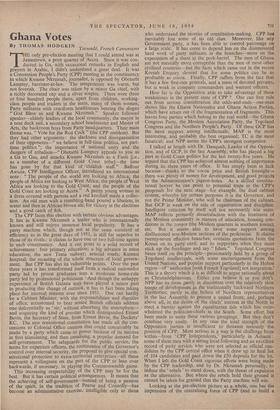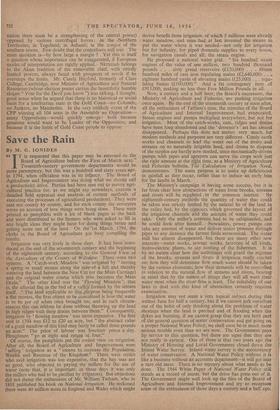Ghana Votes
By THOMAS HODGKIN
Yaounde, French Cameroons
THE only pre-election meeting that I could attend was at Jamestown, a poor quarter of Accra. Since it was con- ducted in Ga. with occasional remarks in English and prayers in Arabic, I didn't understand a great deal. It was a Convention People's Party (CPP) meeting in the constituency in which Kwame Nkrumah, journalist, is opposed by Obetsebi Lamptey, barrister-at-law. The temperature was warm, but not feverish. The chair was taken by a minor Ga chief, with a richly decorated cap and a silver sceptre. There were three or four hundred people there, apart from children, working- class people and traders in the main, many of them women; Party militants with cruciform.headdresses bearing the slogan " God Bless us and Kwame Nkrumah." Speaker followed speaker—elderly leaders of the local community, the mayor in a neat duck suit, a secondary school headmaster and Master of Arts, the backroom boys from Party headquarters. Their main theme was, " Vote for the Red Cock " (the CPP emblem). But they had other arguments : the slackness and disorganisation of their opponents—" we believe in full-time politics, not part- time politics "; the importance of national unity and the dangers of tribalism—" Obetsebi Lamptey appeals to you as a Ga to Gas, and attacks Kwame Nkrumah as a Fanti [i.e., as a member of a different Gold Coast tribe]—the time has gone by for that kind of childish stuff." Baffour Awuna, CPP Intelligence Officer, introduced an international note: " The people of the world are looking to Africa; the people of Africa are looking to West Africa; the people of {Nest Africa are looking to the Gold Coast; and the people of the Gold Coast are looking to Accra." A pretty young woman in a dress covered with parrots and a red kerchief made a collec- tion. An old man with a trembling hand poured a libation, in water and then in African brown ale, for victory in the elections and a good catch of fish. The CPP faces this election with certain obvious advantages. It has in Kwame Nkrumah a leader who is internationally known and still enjoys immense local popularity. It has a party machine which, though not at the- same standard of efficiency as in the great days of 1951, is still far superior to those of its rivals : it claims to have one or two full-time agents in each constituency. And it can point to a solid record of achievement : free primary education; a big advance in mass education; the new Tema railway; arterial roads; Kumasi hospital; the recasting of the whole structure of local govern- ment. But CPP has also its vulnerable points. Over the past three years it has transformed itself from a radical nationalist party led by prison graduates into a moderate home-rule party led by professional politicians. And though the unhappy experience of British Guiana may have played a minor part in producing this change of outlook, it has in fact been taking place for internal reasons ever since 1951. One can hardly be a Cabinet Minister, with the responsibilities and dignities of office, accustomed to hear senior British officials address one deferentially as ' sir,' without absorbing the atmosphere— and acquiring the kind of gravitas which distinguished Ernest Bevin, the Secretary of State, from Ernest Bevin, the Dockers' KC. The new transitional constitution has made all the- con- cessions to Colonial Office caution that could conceivably be made by a party which came to power because of its success in first stimulating, and then canalising, a popular demand for self-government. The safeguards for the public service, the terms for expatriate officers, the continuance of the Governor's control over internal security, the proposal to give special con- stitutional protection to extra-territorial enterprises—all these represent a willingness on the part of the CPP to lean over backwards, if necessary, in playing the Commonwealth game. This increasing respectability of the CPP may be for the best. But it has certain political consequences. It means that the achieving of self-government—instead -of being a passion of the spirit, in the tradition of Pearse and Connolly—has become an administrative exercise, intelligible only to those who understand the niceties of constitution-making. CPP has inevitably lost some of its old elan. Moreover, like any Government party, it has been able to control patronage on a large scale. It has come to depend less on the disinterested hard work of party militants in the branches—more on the expectation of a share in the pork-barrel. The men of Ghana are not naturally more corruptible than the men of most other civilised countries—but the facts which came out in the recent Korsah Enquiry showed that for some politics can be as profitable as cocoa. Finally, CPP suffers from the fact that it has a few first-rate generals, and a mass of devoted privates, but is weak in company commanders and warrant officers.
How far is the 'Opposition able to take advantage of these weaknesses in the present state of CPP ? One can first rule out from serious consideration the odds-and-ends—one-man shows like the Ghana Nationalist and Ghana Action Parties, which have arisen out of the fragmentation of fragments. This leaves four parties which belong to the real world—the Ghana Congress Party, the Moslem Association Party, the Togoland Congress and the Northern People's Party. Of these GCP has the most support among intellectuals; MAP is the most interesting, and probably the best organised; TC is the most fanatical; and NPP seems the CPP's strongest competitor.
I talked at length with Dr. Danquah, Leader of the Opposi- tion, and of GCP, in the last Assembly, who has played a big s part in Gold Coast politics for the last twenty-five years. He argued that the CPP has achieved almost nothing of importance during its three years of office. It has simply been in luck because—thanks to the cocoa price and British foresight— there was plenty of money for development, and good projects in the Administration's pigeon-holes. As a skilled constitu- tional lawyer he can point to potential traps in the CPP's proposals for the next stage—for example, the dual cabinet system, whereby for certain purposes it is the Governor, and not the Prime Minister, who will be chairman of the cabinet. But GCP is weak on the side of organisation and discipline. Intelligent criticism by itself will not necessarily win seats. MAP reflects primarily dissatisfaction with the treatment of the Moslem community in matters of education, housing con- ditions in the zo.ngos (the Moslem quarters in southern towns). etc. But it seems also to have some support among disillusioned non-Moslem sections of the proletariat. It claims twenty-seven effective branches; contains quotations from the Koran on its party card; and its supporters when they meet stick up the forefinger and say " Islam." Togoland Congress bases itself on the principle—passionately held by a group of Togoland intellectuals, with some encouragement from the United Nations, and popular support particularly in the Hohoe region—of unification [with French Togoland] not integration.' This is a theory which it is as difficult to argue rationally about as Christadelphianism. Either you believe it or you don't. NPP has its roots partly in discontent over the relatively slow tempo of development in the traditionally backward Northern Territories; partly in the failure of Northern representatives in the last Assembly to present a united front; and, perhaps above all, in the desire of the chiefs' interest in the North to erect a barrier against the equalitarian tide which has over- whelmed the politician-chiefs in the South. Some effort has been made to unite these various groupings. But they don't combine very easily. In any case the total strength of the Opposition parties is insufficient to threaten seriously the position of CPP. More serious in a way is the challenge from within—from CPP Independents,' particularly in Ashanti : some of them men with a strong local following and an excellent record of party service, who were not selected as official can- didates by the CPP, central office when it drew up its final list of 104 candidates and paid down the £50 deposits for the lot. When I left the Gold Coast vigorous efforts were being made by the CPP leadership, and by Dr. Nkrumah personally, to induce the ' rebels ' to stand down, with the threat of expulsion as the alternative. But where the rebels hold their ground it cannot be taken for granted that the Party machine will win.
Looking at the pre-election picture, as a whole, one has the impression of the centralising force of CPP (and to build a ation there must be a strengthening of the central power) pposed by various centrifugal forces : in. the -Northern erritories; in Togoland; in Ashanti; in the zongos of the odes of interpretation are rigidly applied.- Nkrumah belongs uthern towns. Few doubt that the centralisers will win. The M question is—by how large a margin ? Yet this is itself question whose importance can be exaggerated, if European the Akan tradition of the removable chief, with strictly iited powers, always faced with prospects of revolt if he oversteps the limits. Mr. Casely Hayford, formerly of Clare College, Cambridge, now Minister of Agriculture and Natural Resources (whose election poster carries the beautifully humble slogan " Vote for the Devil you know ") was talking. 1 thought, good sense when he argued that there is no historical or social basis for a totalitarian state in the Gold Coast—no Colonels, no Junkers, no Mandarins. In the very unlikely event of the CPP winning all 104 seats in the Assembly an Opposition— many Oppositions—would quickly emerge : both because someone would want to be Leader of the Opposition; and because it is the habit of Gold Coast people to oppose.



















































 Previous page
Previous page